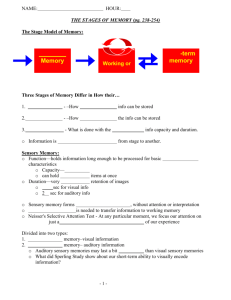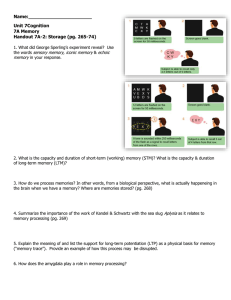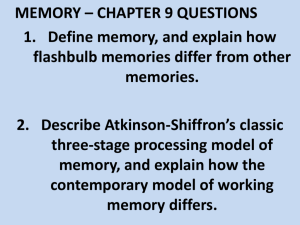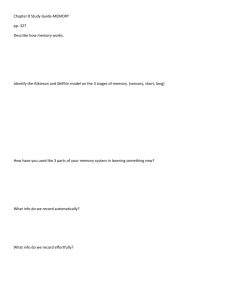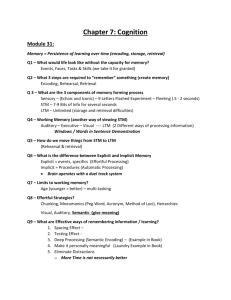LTM: Misremembering & Forgetting
advertisement
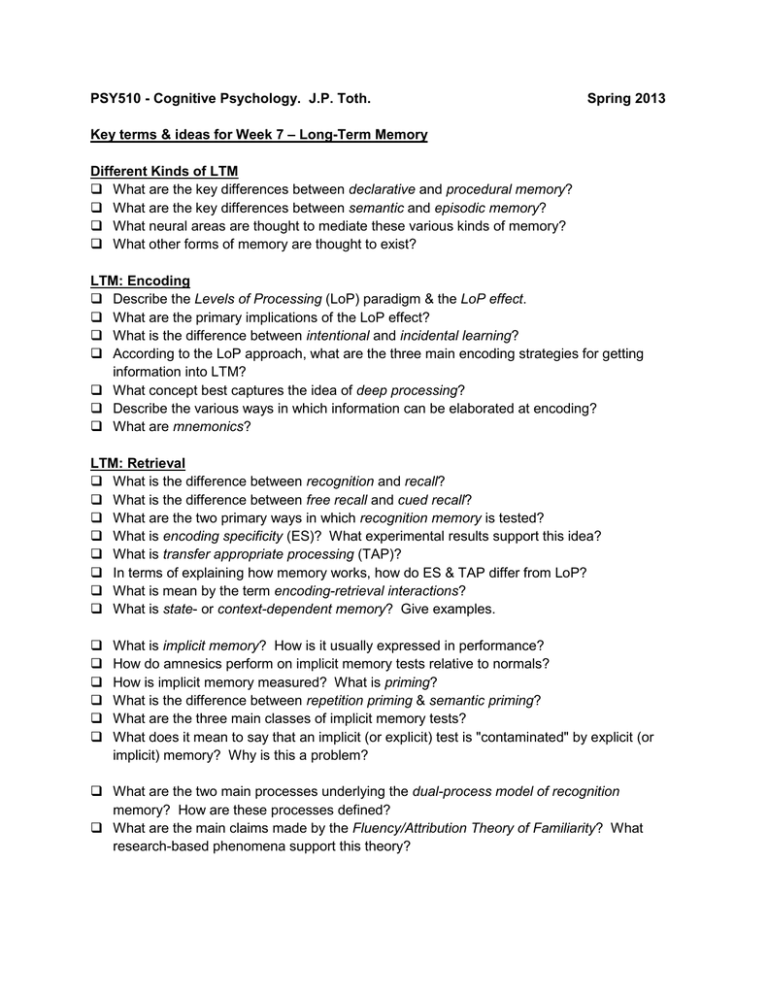
PSY510 - Cognitive Psychology. J.P. Toth. Spring 2013 Key terms & ideas for Week 7 – Long-Term Memory Different Kinds of LTM What are the key differences between declarative and procedural memory? What are the key differences between semantic and episodic memory? What neural areas are thought to mediate these various kinds of memory? What other forms of memory are thought to exist? LTM: Encoding Describe the Levels of Processing (LoP) paradigm & the LoP effect. What are the primary implications of the LoP effect? What is the difference between intentional and incidental learning? According to the LoP approach, what are the three main encoding strategies for getting information into LTM? What concept best captures the idea of deep processing? Describe the various ways in which information can be elaborated at encoding? What are mnemonics? LTM: Retrieval What is the difference between recognition and recall? What is the difference between free recall and cued recall? What are the two primary ways in which recognition memory is tested? What is encoding specificity (ES)? What experimental results support this idea? What is transfer appropriate processing (TAP)? In terms of explaining how memory works, how do ES & TAP differ from LoP? What is mean by the term encoding-retrieval interactions? What is state- or context-dependent memory? Give examples. What is implicit memory? How is it usually expressed in performance? How do amnesics perform on implicit memory tests relative to normals? How is implicit memory measured? What is priming? What is the difference between repetition priming & semantic priming? What are the three main classes of implicit memory tests? What does it mean to say that an implicit (or explicit) test is "contaminated" by explicit (or implicit) memory? Why is this a problem? What are the two main processes underlying the dual-process model of recognition memory? How are these processes defined? What are the main claims made by the Fluency/Attribution Theory of Familiarity? What research-based phenomena support this theory? LTM: Misremembering & Forgetting What does it mean to say that memory is reproductive vs. reconstructive? What metaphors are associated with these two views of memory? What classic memory researchers are most closely associated with ideas of memory as reproduction vs. reconstruction? Define the idea of memory consolidation. Describe the Deese, Reodiger, McDermott (DRM) paradigm. What is the DRM effect & how is it explained? What are schema & scripts? How do they help memory? How do they create false memories? Define imagination inflation. How does Loftus's misinformation paradigm work? What is a misinformation effect? Define source memory & source confusion. What is the Sleeper Effect? Give an example for how priming & source confusion might lead to false memory. What does the Jennifer Thompson case say about the distinction between memory as reproduction vs. reconstruction? Can false memories be easily avoided or detected? In what ways do hypnosis and "truth serum" drugs effect memory? Can false memories be detected via emotion, confidence, recollection, or retrieval speed? What is the forgetting curve? Who first described it and what does it tell us about memory? What are the 3 main theories of forgetting and how do they work? What are flashbulb memories? In what ways do emotional, flashbulb, and traumatic memories differ from normal memories? Describe the repressed/recovered/false-memory debate.


